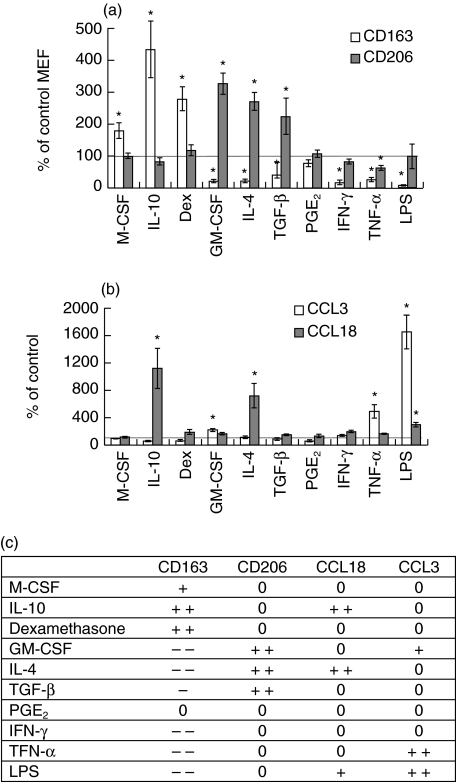Fig. 2.
(a) Effect of pro- and anti-inflammatory stimuli on CD163 and CD206 expression. Mature macrophages were treated from day 8 to day 12 with a panel of pro- and anti-inflammatory molecules. Levels of CD163 and CD206 expression at the membrane were then assessed by quantitative flow cytometry. Results are expressed as a percentage of untreated cells mean equivalent fluorochrome (MEF) ± s.e.m. for five independent donors. *P < 0·05, Student's unpaired t-test. (b) Effect of pro- and anti-inflammatory stimuli on the production of CCL3 and CCL18. Mature macrophages were treated from day 8 to day 12 with a panel of pro- and anti-inflammatory molecules, and CCL3 and CCL18 production was assessed by enzyme-linked immunosorbent assay (ELISA). Concentration values were normalized on the basis of tetrazolium salt (MTT) assay results, to account for variations in cell viability. Results are expressed as a percentage of untreated cells cytokine production ± s.e.m. for five independent donors. *P < 0·05, Student's unpaired t-test. (c) Summary of the effect of pro- and anti-inflammatory stimuli on tested markers showing the data displayed in (a) and (b). The effect of the different stimuli on the four markers tested are indicated as follows: 0: no effect; + and ++ : slight and strong increase, respectively; – and –: slight and strong decrease, respectively. Only significant effects are considered. The chosen cut-off for a strong versus slight effect are twofold modulations for flow cytometry and threefold for cytokine expression.

